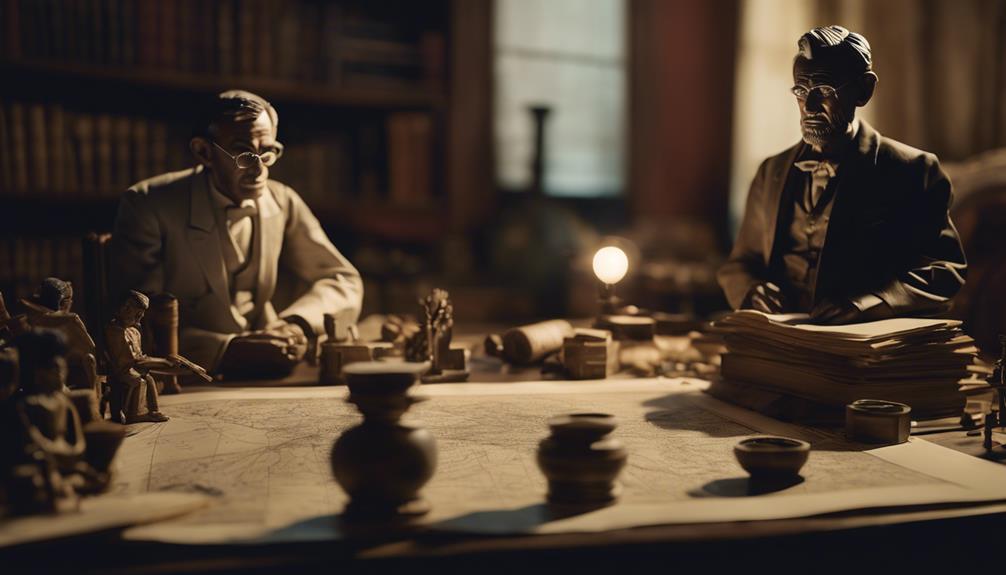If you're looking to understand the masters of persuasion, you should consider historical figures like Gandhi, Lincoln, and King. They used unique strategies to negotiate change. Gandhi's nonviolent resistance inspired millions in the fight for India's independence. Lincoln bridged national divides through storytelling that emphasized shared humanity. Churchill rallied Britain with his wartime speeches, instilling hope against tyranny. King envisioned a future of equality, urging compassion and unity among all people. Each figure utilized powerful diplomatic skills to forge significant change. The impact of these negotiators shaped history in profound ways, and there's more to discover about their powerful techniques.
Key Takeaways
- Gandhi utilized nonviolent resistance and civil disobedience to effectively challenge colonial powers and inspire collective action for India's independence.
- Lincoln's storytelling bridged divides during the Civil War, fostering unity and resilience through relatable anecdotes and moral lessons.
- Churchill's wartime speeches galvanized British morale, instilling hope and determination during WWII through powerful and evocative language.
- Martin Luther King Jr. envisioned equality and justice, using nonviolent resistance to inspire a movement that sought systemic change and unity.
Gandhi's Nonviolent Resistance Strategies
Mahatma Gandhi's nonviolent resistance strategies, rooted in civil disobedience and fasting, effectively mobilized millions in the struggle for India's independence.
You can see how these tactics challenged British authority without resorting to violence. By promoting peaceful protests and boycotts, Gandhi united diverse groups under a common cause.
His famous salt march exemplified this, showing how simple acts of defiance could inspire widespread action. When you embrace fasting, it becomes a powerful tool for self-purification and moral persuasion, compelling others to reconsider their stance.
Gandhi's approach not only highlighted injustice but also fostered a sense of shared purpose among Indians. His legacy teaches you the strength found in peaceful resistance and the impact of collective action in the face of oppression.
Lincoln's Storytelling and Unity
Abraham Lincoln masterfully used storytelling to bridge divides and foster unity among a fractured nation during the Civil War. He understood that narratives could resonate with people on a personal level, making complex issues more relatable.
By sharing anecdotes, he painted vivid pictures of hope and resilience, reminding citizens of their shared humanity. His famous tales, often infused with humor, helped ease tensions and build rapport.
Lincoln's speeches, rich with moral lessons, encouraged Americans to envision a united future. By appealing to emotions and values through storytelling, he inspired trust and cooperation, ultimately guiding the nation toward reconciliation.
In a time of great strife, his narratives became powerful tools for persuasion and healing.
Churchill's Wartime Eloquence

Churchill's wartime eloquence galvanized the British people, rallying them during one of history's darkest hours with speeches that instilled hope and determination.
You can feel the power in his words, as he painted vivid images of resilience against tyranny. Phrases like 'we shall fight on the beaches' became rallying cries, uniting a nation under threat.
His ability to communicate urgency and courage resonated deeply, pushing citizens to endure the trials of war. Churchill knew that his speeches weren't just words; they were tools for motivation.
King's Vision for Equality
Martin Luther King Jr. envisioned a future where equality and justice prevailed, inspiring countless individuals to join the fight for civil rights. You can feel the power of his words as they resonate through history, urging everyone to recognize the importance of unity and compassion.
King believed that nonviolent resistance was the key to creating lasting change, appealing to the conscience of a nation. His dream wasn't just about desegregation; it was about dismantling systemic oppression and ensuring everyone had equal opportunities.
Diplomatic Skills in History

Throughout history, effective diplomatic skills have shaped nations and influenced global events, much like how King's vision for equality galvanized a movement for change.
You can see this in the actions of figures like Mahatma Gandhi, who used nonviolent resistance to challenge colonial powers, or Abraham Lincoln, whose storytelling united a divided nation.
Winston Churchill's eloquence during WWII rallied a country facing despair, while Nelson Mandela emphasized dialogue and reconciliation to dismantle apartheid.
Each of these leaders understood that persuasion goes beyond mere words; it requires empathy and strategic thinking.
Frequently Asked Questions
What Are the Key Traits of Successful Negotiators Throughout History?
Successful negotiators throughout history share key traits: strong communication skills, empathy, strategic thinking, and the ability to unite diverse perspectives. They also leverage storytelling and emotional intelligence to persuade others and achieve meaningful outcomes.
How Did Personal Backgrounds Influence These Leaders' Negotiation Styles?
Personal backgrounds shape negotiation styles significantly. You'll find that experiences, cultural influences, and values drive leaders like Mandela and Gandhi to adopt unique approaches, blending empathy with strategy to achieve their goals effectively.
What Modern Negotiation Techniques Are Inspired by Historical Figures?
Modern negotiation techniques draw inspiration from historical figures' methods. You can apply storytelling, active listening, and empathy to build rapport, just as they did. Embrace strategic thinking and emotional framing to enhance your negotiation skills effectively.
How Can Their Strategies Be Applied in Today's Conflicts?
You can apply their strategies today by embracing empathy, fostering open dialogue, and utilizing storytelling to connect. Nonviolence and collaboration can transform conflicts, helping you build understanding and find common ground in challenging situations.
What Role Did Culture Play in Their Negotiation Approaches?
Culture shapes negotiation styles, influencing communication methods, values, and expectations. By understanding cultural nuances, you can adapt your approach, build rapport, and foster collaboration, enhancing your effectiveness in resolving conflicts and achieving desired outcomes.
Conclusion
In exploring the strategies of these historic negotiators, you've uncovered powerful lessons in persuasion that can transform your own approach to conflict and dialogue. By learning from the methods of these historic negotiators, you are essentially unveiling the past and using it as a guide for the present. By incorporating their tactics into your own negotiations, you can enhance your effectiveness and achieve more favorable outcomes. Whether it’s through understanding body language, active listening, or building rapport, the lessons from these historic negotiators can greatly impact your approach to conflict resolution. Olympic history reveals hidden treasures that can offer valuable insight into the art of negotiation. By studying the techniques of past negotiators, you can tap into a wealth of knowledge that has been proven effective through the ages. These lessons from the past can serve as a blueprint for success in your own negotiations, ultimately leading to more mutually beneficial agreements and strengthened relationships.
From Gandhi's peaceful resistance to King's visionary speeches, each figure offers a unique perspective on empathy and influence.
By applying their techniques in your life, you can become a master of persuasion yourself, shaping conversations and fostering understanding.
Embrace these lessons, and you might just change the course of your own story.










